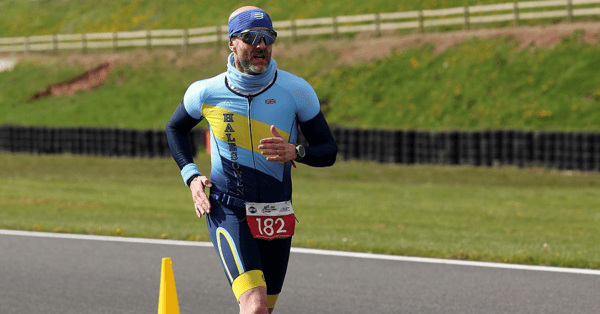Part 1 - In the Spotlight: Stu Hadley - A Q&A Session
nFocus are very proud to supports and sponsors our very own Stu Hadley as he pursues his dream as an athlete representing Great Britain for major events this year.
Rachel and Eve engaged in a captivating discussion with Stu about his upcoming races and his transition from triathlons to duathlons. Stu reveals his next race, the Mallory Park Sprinter Qualifier, aiming for a spot in next year's World Duathlon Championship.

Rachel - Q1: Stu, thank you for sharing your insights with us! Could you tell us more about your next race?
I’ve got Mallory Park Sprinter Qualifier on Sunday. It's a lot shorter than I would normally do. The sprints and the standard duathlon for the World next year, they're on the same day. I've had a go trying to qualify for the standard. I think, I'm in pretty good shape so I'll see what's going to happen. I just go along to the sprints, see if I can't bag a spot for next year. It's on an oval racetrack, which I've never done before so it should be quite a quick race.
Eve - Q2: Many people will be familiar with triathlon events but not so familiar with duathlons, can you tell us what the duathlon involves and how you became involved in this particular sport?
I've been doing triathlon now… I think it’s my 10th year and triathlons involve swimming first, then going onto a bike and then finishing off with a run. Duathlon is a run, a bike and then another run, generally a shorter distance.
So, when I was off the back of competing in Ironman UK, I had all this fitness and I decided to give duathlon a go again. I think I've only done one duathlon prior to last year and they are quite aggressively tough because you can go as fast as you can for the length of the race.
With triathlon, I'm a decent runner, I'm a decent biker, but I'm an average swimmer. I realised that the amount of time that I would need to dedicate to improving my swimming to a point where I could be considered to compete against other GB athletes was just a non-starter. So, I just decided to apply more effort into the running and the biking for a duathlon to see where it took me. With the level of fitness that I had after Ironman UK, I basically changed my approach and did a lot more high intensity and shorter distance work that got me to the point where moving up an age group gave me a really good opportunity to switch sports.
Although, I still love triathlon. I've got one triathlon booked in this year so far, but the focus this year has definitely been duathlons. I really should have switched to duathlons sooner. But what's involved and the reason I've done the switch from triathlon to duathlon has allowed me to compete at GB level.
Eve - Q3: Competing at the GB level is a fantastic achievement! You have qualified for the Duathlon European Final which will be held in Alsdorf, Germany on the 5th of May, how is your training going?
Yes, it's been good! One of the key things that allowed me to get to this level of fitness has been all the strength and conditioning that I've been doing. I spoke to a Coach, a Perspective Coach. It’s probably almost two years ago. I'd been recommended by a friend and when we started working together, it was quite a shift into doing lots of strength conditioning, building up strength in my legs, which effectively varied. So, I do strength conditioning Mondays through to Fridays in addition to all the rest of the training.
The strength conditioning has allowed me to build up that strength in the legs and the rest of the core. My increased physical strength allows me to train at a higher intensity level than I've ever experienced before, and it has been crucial in enabling me to push myself without risking injury.
So, I was up at 5.30am this morning and I was at the track for quarter past six. At half past six, we started doing an hour warm up, which was just getting the body ready for the load that I was going to put on it. I felt that I had a really good session this morning. I had an hour of hard sprints and a 30-minute race pace session yesterday. We call it “sharpening the axe, ready to chop the trees down.” The strength conditioning and all the high intensity stuff go hand-in-hand.
The training has been going well, and I'm feeling quite fit. This week will likely be easier as I focus on lower-intensity workouts, gearing up for the Sprint World Qualifier on Sunday. It's exciting because there will be a lot of fast competitors at the event, which is perfect preparation for the upcoming Alsdorf event that involves lots of short, sharp, high-intensity efforts. I'm feeling confident about my performance. In my race section, there will be 27 participants, so worst-case scenario, I'll rank 27th fastest in Europe for my age group in two and a half weeks. However, I also see this as an opportunity to potentially reach the podium. You never know what could happen! That's my goal/aim, and I'm eager to see how it all unfolds.
Eve – Q4: Impressive! To further expand on the training, I’m interested to know which is your strongest element of the duathlon, can you give us an idea of what other training you do leading up to such a prestigious event.
I come from a running background, so I'm enjoying the running, but as you'd expect, I've been training harder and longer. I've been getting quicker and quicker both in the running and the biking which has been quite noticeable because I've got a friend of mine who's also a GB athlete. He was at the track this morning and he's a lot quicker than me. So, I think I've got to probably go with running. That's where I've noticed the most improvement.
I've also noticed an improvement in my biking as well but having the ability to get on the run and start overtaking people. It's a reflection of all the training that I put in. We do lots of things called brick sessions where I'll go for a run and I'll get on the bike, then I'll go for a run. You kind of get your legs going because it's different muscles when you're running to when you're biking. You get your muscles from switching to both.
I remember the first time I did a triathlon, I started running after being on a bike and it just felt Bambi on ice! But I'm at the point now where I can jump off a bike or jump onto a bike after having gone for a run and I don't really notice any difference. You put the training in and that's kind of what you get for. It pays off when you get on the course, and you start overtaking people. It's a pretty good feeling because it's one thing working towards something.
When I first started working with my Coach, you kind of put all your faith in Mike that he's going to give me a plan and he's going to put it together. You hope if you follow the plan, it's going to give you the rewards that you want. But at the end of the day, it's an investment and I started seeing that pay off quite quickly after we started working together. It's a pretty good feeling knowing that if you're prepared to put the time and effort in… grit your teeth, you will get benefits and you will get rewards. The rewards are… you get quicker than other people and you end up qualifying for Team GB, which was something that I always knew people were doing, but not something I ever considered or thought I was capable of. But it all comes down to hard work, discipline and putting the graft in.
Rachel – Q5: When did you make the transition from doing this as a hobby to being a competitor in these sports?
At what point, did you determine that you were prepared to seek professional coaching to elevate your performance to the next level?
Because there's that much training involved with competing in an Ironman event. You've got a 2.4-mile swim, a 112-mile bike ride, then you've got to finish off with a 26-mile marathon. There is so much effort required to do it. I didn't want to be in a position where I was focusing my efforts in the wrong place. When I did Ironman Wales in 2017, I had a Coach and that kind of paid off.
When I got with Mike a couple of years ago, that was when I wanted to make sure that I was focusing my efforts on the right place. I know as a person if a plan is written down in front of me that tells me to do session one on Mondays, session two on Tuesday, so on and so forth. I know that works for me. If I had a self plan, I don't think I would be able to stick to it as much. I probably know my mindset has changed quite a bit over the years as I've been doing track so long. Having Mike tell me what I need to do helps.
Last year, we had such a good year competing and that exceeded my expectations. So, I know that he knows what he's talking about. So having a Coach that tells me what to do and when is good and really helps. But I do get obsessive with things, particularly exercise as I've always been into exercise. So being able to know that I've got a plan that's going to get me to a certain level for a certain time is obviously all part and parcel of hitting your races at your peak.
Rachel - As you were discussing that, I found it quite intriguing! It's fascinating to consider the progression from competing independently in Ironman events, where some individuals do so without formal coaching, to reaching a level where you're competing for Team GB in triathlons and duathlons. I was curious about how you navigated that transition and what steps were pivotal in your journey.
Part 1 of our engaging blog series with Stu is now complete. Stay tuned for Part 2 of our series, titled ‘Duathlon or Dua Lipa?': Stu's Training Tracks, where we'll explore Stu's training routines, motivational insights, and even discover the beats that keep him going during duathlon races & training sessions. Don't miss out!








.png)
